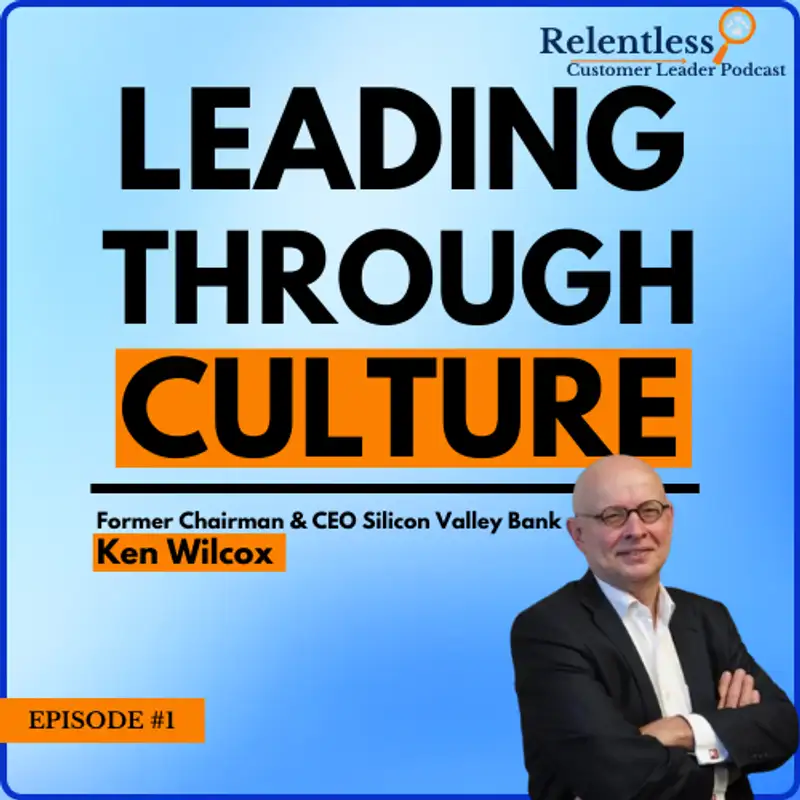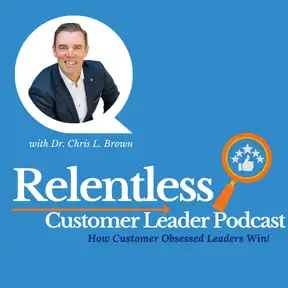Ken Wilcox Former CEO of Silicon Valley Bank and Dr Chris L. Brown discussing Leadership and Culture | Relentless Customer Leader Podcast
Summary
Ken Wilcox, former CEO of Silicon Valley Bank, shares his journey and leadership philosophy. He emphasizes the importance of self-actualization and creating a positive customer experience. Ken's leadership style is centered around diversity in counsel and unity in action. He encourages decision-making at all levels of the organization and fosters a culture of open discussion and commitment to executing decisions. Ken also discusses the spectrum of human behavior, from passive-aggressive to obnoxiously assertive, and the need to coach individuals towards a more collaborative and accountable mindset. In this conversation, Ken discusses the importance of listening to the voice of your conscience and building a culture where employees make the right decisions on their own. He shares the attributes of great leaders, including being aware of their influence on others and focusing on the future. Ken also reflects on his leadership journey, highlighting the importance of recognizing and addressing areas for improvement. He discusses the challenges of integrating different cultures in acquisitions and the need for tools to assess organizational culture. Finally, Ken talks about his upcoming book on doing business in China and the lessons he learned from his experience there.
Takeaways
Leaders should focus on self-actualization and creating a positive customer experience
Encourage decision-making at all levels of the organization
Foster a culture of open discussion and commitment to executing decisions
Coach individuals towards a collaborative and accountable mindset Building a culture where employees listen to their conscience and make the right decisions on their own is more effective than constant monitoring.
Great leaders are aware of the influence they have on others, involve others in decision-making, and focus on the future.
Cultural differences can be a major challenge in acquisitions, and it's important to assess and address these differences.
Tools to assess organizational culture can help in understanding and improving the culture of a company.
Doing business in China requires understanding the differences in goals and expectations between Western companies and the Chinese Communist Party.
Sound Bites
"I decided that we needed to get rid of all of the people at the ends of the spectrum, either by coaching them to the middle or by inviting them to work somewhere else."
"We should try to be in the one market that differentiates us. Plus, we develop some particular skills there."
"I encouraged everybody at the next level to do the same thing so that we were pushing decisions down to the ground floor as far as we could."
"If we can just get them to listen to it and follow it. We don't have to be monitoring them constantly because they'll want to do the right thing on their own." - Ken referring to the "Voice of Conscience" we all have inside us.
"Great leaders are cognizant of the fact that people are copying them."
"The vast majority of failures on the acquisition front are the result of cultures not meshing."
Learn more from Ken's great book, Leading Through Culture
Want to know how you can understand more about your own organizational culture?
Visit the MRI Benchmark
Ken Wilcox, former CEO of Silicon Valley Bank, shares his journey and leadership philosophy. He emphasizes the importance of self-actualization and creating a positive customer experience. Ken's leadership style is centered around diversity in counsel and unity in action. He encourages decision-making at all levels of the organization and fosters a culture of open discussion and commitment to executing decisions. Ken also discusses the spectrum of human behavior, from passive-aggressive to obnoxiously assertive, and the need to coach individuals towards a more collaborative and accountable mindset. In this conversation, Ken discusses the importance of listening to the voice of your conscience and building a culture where employees make the right decisions on their own. He shares the attributes of great leaders, including being aware of their influence on others and focusing on the future. Ken also reflects on his leadership journey, highlighting the importance of recognizing and addressing areas for improvement. He discusses the challenges of integrating different cultures in acquisitions and the need for tools to assess organizational culture. Finally, Ken talks about his upcoming book on doing business in China and the lessons he learned from his experience there.
Takeaways
Leaders should focus on self-actualization and creating a positive customer experience
Encourage decision-making at all levels of the organization
Foster a culture of open discussion and commitment to executing decisions
Coach individuals towards a collaborative and accountable mindset Building a culture where employees listen to their conscience and make the right decisions on their own is more effective than constant monitoring.
Great leaders are aware of the influence they have on others, involve others in decision-making, and focus on the future.
Cultural differences can be a major challenge in acquisitions, and it's important to assess and address these differences.
Tools to assess organizational culture can help in understanding and improving the culture of a company.
Doing business in China requires understanding the differences in goals and expectations between Western companies and the Chinese Communist Party.
Sound Bites
"I decided that we needed to get rid of all of the people at the ends of the spectrum, either by coaching them to the middle or by inviting them to work somewhere else."
"We should try to be in the one market that differentiates us. Plus, we develop some particular skills there."
"I encouraged everybody at the next level to do the same thing so that we were pushing decisions down to the ground floor as far as we could."
"If we can just get them to listen to it and follow it. We don't have to be monitoring them constantly because they'll want to do the right thing on their own." - Ken referring to the "Voice of Conscience" we all have inside us.
"Great leaders are cognizant of the fact that people are copying them."
"The vast majority of failures on the acquisition front are the result of cultures not meshing."
Learn more from Ken's great book, Leading Through Culture
Want to know how you can understand more about your own organizational culture?
Visit the MRI Benchmark

